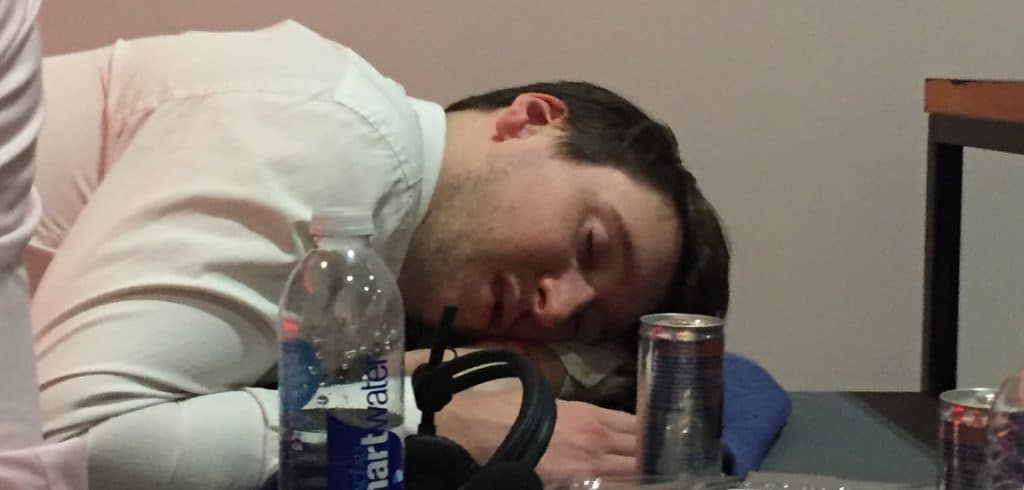Caster and Story Mob comms strategist Ceirnan ‘Excoundrel’ Lowe gets some shut-eye at a UK LAN a few years ago
A new research study claims to be the first to provide evidence that stress can predict mental ill health in esport athletes.
It found, unsurprisingly, that stress, sleep problems, burnout and social phobia anxiety may all adversely impact esports players’ mental health.
The study – carried out by researchers from the University of Chichester in collaboration with the University of Winchester and King’s College London – surveyed 313 student esports players who play either CSGO, Valorant or Rainbow Six Siege. These are all games played frequently in student leagues in the UK, including NUEL and NSE.
The esports athletes completed surveys which addressed categories of stressors resulting from competing in esports, including around teammate interactions, personal and teammate concerns and game-specific worry, as well as variables including sleep quality, burnout and social phobia anxiety and outcome measures of mental ill health.
The report stressed the importance of sleep, with sleep ‘being a strong predictor of the respective variables of mental ill health’. Sleep predicted 33.7% of the variance of general signs of anxiety and depression, and 49.2% of the variance of more severe depression, and 41.4% of the variance of psychological distress.
“Our results highlight sleep as a key variable that is linked with mental ill health. Thus, interventions are needed to improve the quality of sleep of esport athletes to improve their mental health,” the study noted.
“There is a lack of research examining mental health in esports athletes. From implementing interventions to improve quality of sleep, to providing esports athletes with strategies to deal with the demands of their sport to avoid burnout, there are practical steps that can be taken to address the factors which we now know can predict mental ill health.”
Dr Matt Smith, University of Winchester
It also noted the incidence of mental ill health ‘is highly prevalent in esports athletes at a level comparable to other professional sports, for example football. Improving the mental health of athletes is now a priority for many sporting organisations, but before this study, there has not been an evidence base of the mental health risk factors underpinning mental ill health in university based esports athletes’.
The study was conducted by Dr Matt Smith, Dr Phil Birch and Ben Sharpe at the University of Chichester and Atheeshaan Arumuham at King’s College London. Sampling was used via collaborator networks, social media and partnership with UK university-based esport body NUEL.
Researchers developed a pool of 33 stressors using esports and sports literature, which was scrutinized by an external panel from the esports community using a five-point rating scale (ranging from 1 ‘not stressful’ to 5 ‘extremely stressful’).
It’s been published after another recent, similar study explored stress and coping in League of Legends, and the idea of using ‘positive stress’ as a motivator to perform.
Dr Matt Smith, lead author of the study and a sport and exercise psychologist and senior lecturer in the University of Winchester’s Faculty of Health and Wellbeing, commented: “There is a lack of research examining mental health in esports athletes. From implementing interventions to improve quality of sleep, to providing esports athletes with strategies to deal with the demands of their sport to avoid burnout, there are practical steps that can be taken to address the factors which we now know can predict mental ill health.”
“Esports athletes face specific demands that vary from those faced by traditional sports athletes,” added Atheshaan Arumuham, an applied practitioner in psychosis studies and one of the study’s authors. “For example, the need to use skilled fine motor co-ordination while facing a high cognitive workload that includes attention, information-processing and visuo-spatial skills and the lack of an ‘off season’ means there are unique stressors for esport athletes which are linked to mental ill health.”
Co-author Dr Phil Birch, a senior lecturer in sport and exercise psychology at the University of Chichester, added: “We hope our study informs the development of evidence-based healthcare provision to support mental health in esports and beyond.”
The investigation team suggest that improving the mental health of athletes ‘should now be a priority’ for major esports organisations and competitions worldwide.
Must-Read Casino & Betting Guides
Check out our featured gaming guides to find top UK casinos, no verification sites, fast withdrawal platforms, and more.
- Top Online Casinos UK 2025
- Bitcoin Casinos to Play at in July 2025
- Top Online Betting Sites 2025
- No KYC Casinos UK
- Best Non Gamstop Casinos

Dom is an award-winning writer and finalist of the Esports Journalist of the Year 2023 award. He has almost two decades of experience in journalism, and left Esports News UK in June 2025.
As a long-time gamer having first picked up the NES controller in the late ’80s, he has written for a range of publications including GamesTM, Nintendo Official Magazine, industry publication MCV and others. He also previously worked as head of content for the British Esports Federation.


